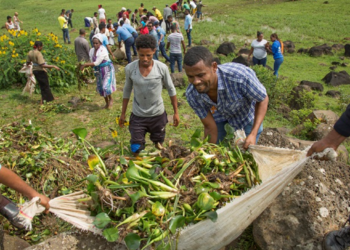Halieutis 2025: Agadir, the Gateway to Morocco and Africa’s Blue Economy -Agadir, Morocco – The seventh edition of the Halieutis International Fair marked a significant milestone in Morocco and Africa. Aziz Akhannouch, the President of the Government of Morocco, inaugurated the event in the presence of Ahmed El Bouari, Minister of Agriculture, Fisheries, Rural Development, Water, and Forests, and Zakia El Driouch, Secretary of State for Maritime Fisheries. Under the high patronage of King Mohammed VI, the exhibition runs until February 9, 2025, welcoming 523 exhibitors from 54 countries, including South Korea, the United Kingdom, India, and Oman for the first time.
A Platform for Sustainable Maritime Development
Held amid global geopolitical, climatic, and economic shifts, Halieutis 2025 serves as a vital platform for discussions on the Blue Economy in all its dimensions, with a strong focus on sustainability. The fair brings together industry leaders, policymakers, and investors to explore innovative solutions for sustainable fisheries, aquaculture, and marine industries.
Beyond its economic significance, the exhibition plays an essential educational and cultural role, engaging the public in discovering Morocco’s coastal biodiversity, technological advancements, sustainable fishing practices, traditions, and human heritage.
Moreover, Halieutis fosters meaningful connections, bringing together professionals from Morocco, Africa, and beyond. Colleagues, friends, suppliers, and buyers meet, exchange ideas, and establish partnerships, making it a unique opportunity for collaboration. This was also the case for Blue Life Hub, represented at the event by Gabriele Albano, who actively engaged in strategic exchanges and strengthened international networks.
Africa’s Role in the Global Blue Economy
Morocco’s Halieutis strategy, launched in 2009, has transformed the country into a global leader in fisheries and sardine exports, while reinforcing South-South cooperation with African nations. The country aims to position Africa as a key player in the international blue economy, addressing climate challenges through collaborative marine conservation efforts.
The Blue Belt Initiative (BBI), spearheaded by Morocco, promotes sustainable fishing practices and strengthens partnerships among African coastal nations. Additionally, the Dakhla Atlantic Port, a project under King Mohammed VI’s vision, aims to provide Sahel countries access to the Atlantic, fostering regional economic growth.

Morocco continues to inspire African nations to adopt a unified vision for the blue economy, urging collaboration in sustainable fisheries management, technological innovation, and environmental conservation. As the Halieutis 2025 Fair unfolds, it reaffirms Morocco’s commitment to leading Africa’s maritime future, ensuring that the continent harnesses its oceanic wealth responsibly and sustainably.
Dedicated focus on Souss-MassaRegion: A Blue Economy Hub
This year’s edition highlights the Souss-Massa Region, a key pillar of Morocco’s blue economy, with a 3,500 km Atlantic-Mediterranean coastline rich in biodiversity and international connectivity. The region’s thriving fisheries, aquaculture, coastal tourism, and renewable energy sectors drive economic growth, creating jobs and attracting foreign investment.
Aligned with the 2022-2027 regional strategy, Souss-Massa aims to reinforce its leadership in sustainable marine development, targeting 1 trillion dirhams in blue economy investments by 2030. Public-private partnerships and increased foreign investment are key to strengthening port and maritime industries.
With 180 km of Atlantic coastline, a major fishing port in Agadir, nine landing points, and a seafood industry hub at Haliopolis Park, Souss-Massa offers significant opportunities. The region also boasts advanced desalination infrastructure and a workforce of over 660,000 direct and indirect employees in the fisheries sector.

We discussed the potential of the Souss-Massaregion and its opportunities with Dr. Abdelazize Ikzarn, CEO of the aquaculture company COPAQUA, President of the Association Marocaine de Conchyliculture, Vice President of the Cooperative Aquacole Souss Massa, and Associate Member of the Chambre des Pêches Maritimes Atlantique Centre (CPMA).
The region offers exceptional growth potential, driven by its favorable environmental conditions. For instance, the ocean temperatures in Imiouaddar Bay remain stable around 18°C year-round, with no pollution and natural nutrient enrichment, allowing mussels to reach commercial size in just nine months – a process that takes nearly two years in the Mediterranean. The work extends beyond production, focusing on processed mussels, including ready-to-cook and pre-cleaned products.
This is just one example of the ongoing regional development, which integrates environmental protection, sustainable tourism growth, and support for women’s social cooperatives traditionally engaged in seafood processing.
Halieutis 2025: Agadir, the Gateway to Morocco and Africa’s Blue Economy









